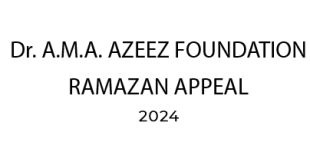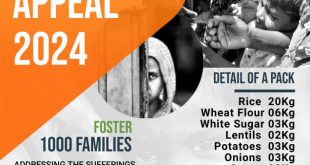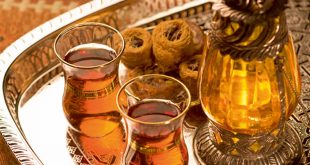MOROCCO

THE majority of Moroccans like Ramadan because of its sacred nature and the congenial atmosphere it engenders. The people spend their days and part of their nights during this month of prayer in the Mosques.
The evening after Maghreb prayers, families and friends break their fast in a cheerful and relaxed atmosphere. Ramadan is the only month when the members of the family meet, every evening, around a table of delicacies.

The housewives prepare special dishes such as harira, the national soup. Typically Moroccan, this soup is very rich in calories and spices, and is generally used to break the fast. It is usually followed by dates or honeycombs chebbakia (wafers coated in honey) or briouates (layers of pastry stuffed with fresh cheese and soaked in honey. Other delicacies include baghrir (Moroccan pancakes) m’semmen (wafers) coated with honey and butter, harcha (containing semolina), sellou (an almond mixture ground with flour and other ingredients), caab ghzale (horn of gazelle cake in stuffed layers of ground almonds) briouate stuffed with shrimps or meat and the national drink:typically Moroccan mint tea.
For the Moroccans, Ramadan is a month of piety, meditation and spirituality and also a festive period, especially after Iftar.
Moroccans as the rest of Muslims regard the last 10 days of Ramadan as highly blessed – especially the 27th night, the Night of the Decree, Laylat Al-Qadr, the night when the Qur’an was revealed to Prophet Mohammed . This is the night on which children are initiated into fasting. And after the breaking of the fast, the boys and young girls dress in beautiful traditional clothes.
In the evening after breakfast most people eat dry fruits (fakiya: dry almonds, nuts, grapes, dates bouzekri and feqqass) with tea and dine on the national dish. For many pious Moroccans, this period is marked by a particular spiritual intensity: they spend their nights reading the Qur’an.
Finally on the last day of Ramadan, Eid Al-Fitr(the festival at the end of the fast) the joy goes hand in hand with the joy of Muslims throughout the world of distributing Zakaah to the needy so they can celebrate the festive season as well.
HYDERABAD, INDIA

RAMADAN in Hyderabad, India, ranks among the most festive times of the year. The homes and the streets are filled with a hustle and bustle that is different from the usual grind of daily life. Ramadan there has a flair that is lively in the evenings and quiet and almost lulled during the day. In fact, most shops and restaurants close during the day, only to open a few hours before the Iftar (fast-breaking) time.

In Hyderabad, men and women have distinct roles. While men spend their days visiting the Masjid for each of the five prayers, the Taraweeh prayer and even spending a few nights in I’tikaaf (to seclude oneself in the Mosque with the pure intention of worship), women spend their time in worship within the confines of their homes; they are busy cooking the special Iftar, Suhoor (pre-dawn meal), and dinner meals, in addition to extra care they spend preparing for the upcoming Eid festivities. Ironically, though Ramadan is about abstaining from food and drink during the day, much of the day could be spent preparing meals and making accommodations for the Eid celebration, which includes grand feasts of elaborate dishes and sweets. Actually, in some households, preparations for the Eid festivities begin with the start of the month.
GHANA
 THE days of Ramadan begin early in the morning. Around 4.00 am drummers walk round the village from house to house playing their drums and singing to wake everyone up. Then people begin preparing the Sohoor (pre-dawn) meal – everyone’s favorite is soup with “tuo zafi”, a soft meal made from maize flour. The fast begins from dawn till sunset.
THE days of Ramadan begin early in the morning. Around 4.00 am drummers walk round the village from house to house playing their drums and singing to wake everyone up. Then people begin preparing the Sohoor (pre-dawn) meal – everyone’s favorite is soup with “tuo zafi”, a soft meal made from maize flour. The fast begins from dawn till sunset.
Fruit for the fasting
Just before sunset people gather in Mosques and read the Qur’an as they wait for the the Athaan (call to prayer) to mark the end of the fast. People bring fruit and water to the Mosque to share with each other. In Ramadan they like to invite friends and relatives to their houses where they share a meal after sunset. The days continue like this until thirty days have passed.
Eid drums
At the end of Ramadan they celebrate Eid. The Eid prayer is held in an open field where Muslims from the nearby villages and towns gather. After the prayers, the chiefs ride majestically on horseback while the people follow them playing drums and singing Muslim songs through the streets until they reach the chief Imaam’s house. Everyone gathers at the Imaam’s house to make supplication and share some food and drink together.
Before leaving for home, people visit the poor and sick and give them food and money so that everyone can enjoy the day of Eid – rich and poor.
TUNISIA
 THE glorious month of Ramadan is special in Tunisia, where life takes a different course, marked with special customs and traditions. The families decorate the front of their houses and those caring for Mosques give them an extra coat of paint and light up the minarets with lamps.
THE glorious month of Ramadan is special in Tunisia, where life takes a different course, marked with special customs and traditions. The families decorate the front of their houses and those caring for Mosques give them an extra coat of paint and light up the minarets with lamps.
The Tunisian family is reunited and strengthens its bonds during this month, which the Tunisians call the “Month of Meeting”, because members of each family find themselves around the same table every day at Iftar (end of the fast). The bonds of solidarity and fraternity consolidate and people visit family and friends frequently.
Many families residing close to a Mosque offer worshippers milk and dates before prayer and the Iftar meal after. In the cities, caravans of solidarity are organized to provide Iftar for the poor and needy.
PAKISTAN
 THE excitement starts when people first catch sight of the Ramadan moon. There is a hustle and bustle in the streets deep into the night as people start preparing for the month of fasting by stocking up on essentials. The men head to the mosques for Taraweeh prayers, while the women start preparing the Suhoor (pre-dawn) meal.
THE excitement starts when people first catch sight of the Ramadan moon. There is a hustle and bustle in the streets deep into the night as people start preparing for the month of fasting by stocking up on essentials. The men head to the mosques for Taraweeh prayers, while the women start preparing the Suhoor (pre-dawn) meal.
To wake everyone up for Suhoor a man tours the neighborhood before dawn, banging on an empty tin. The noise is loud enough to rouse people. The tin he uses is a cheap replacement for the more traditional drum.
Most Pakistanis prefer something substantial for breakfast, such as paratha (buttery flaky flat bread) eaten with a curried dish of their choice. Jalebis (crisp fried orange spirals soaked in sugar syrup) in milk are also a favorite. Whatever the choice of breakfast, it is always followed by tea.
 Food shops and restaurants generally open during Suhoor time then close for the day, only re-opening around at sunset.
Food shops and restaurants generally open during Suhoor time then close for the day, only re-opening around at sunset.
USA
 IN America as well as other non-Muslim countries, the mosque performs a different function than it does in Muslim countries. It is more than a place for prayer and the Friday sermon; the Islamic center is the hub of the entire Muslim community. It is a meeting point for friends and the center of the excitement during Ramadan. Thus, many break their fast in the mosque rather than at home.
IN America as well as other non-Muslim countries, the mosque performs a different function than it does in Muslim countries. It is more than a place for prayer and the Friday sermon; the Islamic center is the hub of the entire Muslim community. It is a meeting point for friends and the center of the excitement during Ramadan. Thus, many break their fast in the mosque rather than at home.
The last few years have been tense years for Muslims living in America trying to clarify what Islam teaches and defining their place in a foreign land. Ramadan is a time for reaching out to non-Muslims in an act of Da’wah (calling to Islam), perhaps inviting non-Muslims to join in their Iftar or contacting the media for positive coverage on the month.
SINGAPORE
 EVERY year during the month of Ramadan, the Geylang Serai (Malay Village, a replica of traditional Malay houses of olden times) comes alive with street bazaars after Taraaweeh prayers. Most of the Muslims live or gather here so it is always filled with large crowds. The street bazaars and night market are called ‘pasar malam’ and are filled with people selling festive items. You can buy new carpets, clothes, bags, nasheed CDs and general household items.
EVERY year during the month of Ramadan, the Geylang Serai (Malay Village, a replica of traditional Malay houses of olden times) comes alive with street bazaars after Taraaweeh prayers. Most of the Muslims live or gather here so it is always filled with large crowds. The street bazaars and night market are called ‘pasar malam’ and are filled with people selling festive items. You can buy new carpets, clothes, bags, nasheed CDs and general household items.
A wide variety of food is also sold at the bazaar. This includes kueh -mueh (Malay cakes and pastries), otah-otah (grilled fish paste in banana leaves), cakes, buns, breads, curry, noodles and delicious curry puff pastries. During the night, the whole place is lit up with glittering lights and decorations, giving the area its much-cherished ethnic flavor.

 Sri lanka Muslims Web Portal Diversity and Inclusiveness
Sri lanka Muslims Web Portal Diversity and Inclusiveness



